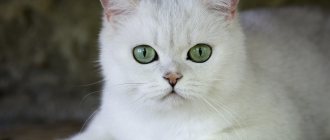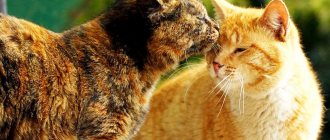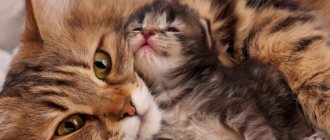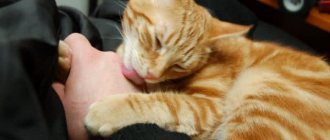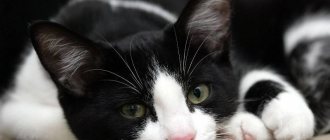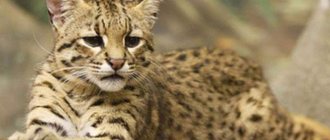Even those who do not consider themselves fans of cats cannot help but agree that they are special and mysterious creatures. Today we will reveal one of the secrets of furry pets and tell you what kind of memory cats have, its types, how long and how much information is stored in cats’ heads. You will also learn how memory and aging are connected, and whether it is possible to develop an animal’s memory.
Eh, I should have not missed the moment then...
Today, people know a lot about cute four-legged pets that can captivate anyone with their hypnotic gaze. But what is hidden behind the beautiful eyes: is it just curiosity or do cats, to one degree or another, remember what they look at?
First of all, let's understand the concept of memory. It is considered one of the highest mental functions responsible for the accumulation, preservation and reproduction of acquired knowledge and skills. It helps to navigate time and space, build relationships and accumulate experience.
Cats' memory is organized differently than humans'. The cat remembers only the information necessary for it, for example, where the tray is, a warm place, what can cause pain, or the sound of food being poured into a bowl. But she does not recognize her cub in an adult cat, since this is insignificant for them and will not help them survive in any way.
Instinct tells the cat that kittens need her care not throughout their lives, but only for a few months
Cat brain structure
A cat's brain weighs only 0.9% of the animal's total body weight. For greater clarity, it is worth mentioning that the human brain weighs 2% of body weight, and the canine brain weighs 1.2%. But as you know, size doesn't matter. The cerebral cortex is primarily responsible for analyzing information coming from the auditory organs. In a cat it consists of 300 million nerve cells, while in a dog there are half as many.
The structure of a cat's brain is 90% the same as a human's
The interaction of the organs of smell, touch and vision with the pet’s brain also occurs through the cortex. The gray matter of a cat's brain is designed to carry out vital actions (heart contractions, yawning, blinking). The cerebellum acts as a kind of “motor” for the pet. It is responsible for walking, running, jumping and the ability to maintain balance.
Hormones produced by the cat's brain regulate most of the pet's body functions. For example, oxytocin (stimulates the process of labor) and antidiuretic hormone (regulates urine concentration) are produced by the hypothalamus, and growth hormones and melatonin (involved in the regulation of sleep and wakefulness) are produced by the pituitary gland.
The cat's brain consumes 20% of the blood pumped by the heart
The connection between the brain and the central nervous system determines the cat’s ability to acquire and apply new knowledge, experience a wide range of emotions and demonstrate certain behaviors.
Memory
Animals immediately forget minor information and, unlike humans, do not store in their memory what is not important for a prosperous existence.
For wild cats, which lead a predominantly solitary lifestyle, such an adaptation mechanism is of great importance. Instincts and memory. Scientists have repeatedly tried to answer the question about the capacity of a cat's memory. However, it is not possible to separate such complex mental functions as perception, memory and learning from instincts. Innate elements of behavior in mammals are inextricably linked with life experience, so it is impossible to say with certainty which actions the mustached-striped one has learned from memory and which it performs at the behest of instinct.
It would be more correct to think that with experience the polishing of genetically embedded knowledge and stable memorization of information occurs:
- hunting rituals are based on the instinct of a predator, but luck is honed through training with each new attempt;
- the algorithm for communicating with relatives is confirmed by socialization;
- caring for offspring is based on parental instinct, but with each lambing, the mother cat acquires practical skills and dexterity.
Trainers believe that cats cannot count, since no one has yet managed to put on a show with a tailed mathematician. However, the mother cat instantly detects the shortage of kittens, “comparing” the current picture with the familiar one and imprinted in memory. This “absence effect” allows cats to sense the departure of one of the family members or a change in the interior of the apartment.
Memory and sensitivity. Undoubtedly, the mental activity of cats is much poorer than that of humans, and their memory capacity is less.
It has been established that cats can retain in long-term memory and subsequently recognize only a few individuals or places. At the same time, the reliability of information storage is quite high and allows cats to perform truly fantastic actions.
For example, there are widespread cases of cats returning to their previous place of residence despite the distance. In Murmansk, they even decided to erect a monument to a local celebrity: a traveling cat named Semyon returned home from Moscow, having covered 2,000 kilometers in 6.5 years.
The most susceptible age of a kitten is considered to be from 2 to 8 weeks, when intensive formation of brain structures occurs along with body growth.
If the baby has not seen people or had contact with them during the specified period, then it will be difficult to tame him later. It is on the sensitivity of the psyche that the process of domestication of young jungle cats, ocelots and cheetahs is based.
Can a cat remember?
There is an opinion that for cats it doesn’t matter who is next to them, only comfort matters. Perhaps they don't remember the owner?
Due to their nature, cats do not show much affection, but, in fact, they know their owner. It would be more correct to say that they feel: it is unlikely that appearance plays a significant role in how cats recognize their owners. Rather, their developed sense of smell, touch and hearing allows them to do this.
Mustachioed stunt performers are the best proof of their ability to remember
Vision for felines is not the main organ of perception. They paid for their ability to see in the dark with the inability to distinguish most colors familiar to people. They only distinguish yellow-green, blue and gray shades well. Fluffy pets have difficulty distinguishing between objects closer than half a meter and static objects, although they can detect the slightest movement from 900 meters away.
Does memory help learning?
Observation and experience allow cats to learn everything they need to live a comfortable life. With the help of memory, they choose what will be useful and what allows them to react in the most appropriate way the next time the same situation occurs. Memory works both at home and in nature, since from childhood they watch their mother to find out everything they need.
This system allows the cat to remain safe while at the same time identifying familiar people and remembering all the positive things associated with them; such as delicious food, affection, and hours of play! What a cat learns is directly related to the benefits they can derive from that learning.
We invite you to read: Acne on the chin of cats: treatment, how to treat, photos
If they find that it doesn't suit them, it will likely be resolved by their short-term memory. This is why it is so difficult in most homes to prevent them from scratching in certain areas. Although you can train your pet to use a scratching post, it is not always possible to train them.
Long-term and short-term memory
What are these features of the memorization process associated with? This is primarily due to the presence of 2 completely different types of memory:
- short-term - a process of relatively short duration (a few seconds or minutes), but sufficient for accurate reproduction of the events that just occurred;
- long-term is characterized by the relative duration and durability of the preservation of the perceived material, a kind of “storehouse” of knowledge.
Which one is most developed, how long does a cat’s memory last, is it good?
Duration of information storage
During the experiments, it was revealed that cats remember the location of hidden goodies for 16 hours. Dogs can forget about it after just 5 minutes. Scientists have not yet established much about the long-term memory of cats. For events to be transferred into the long-term, they must have some vital significance for the animal so that they can make a choice and save this event for the future.
Cats have selective memory: they remember especially well everything related to food, since this topic is vital in the wild.
Cats have well-developed visual memory, but... only if no one interferes with them in the process of memorizing. This means that cats are able to remember any obstacle in their path for only about 10 minutes. If you distract your pet at this time, the cat forgets that it must “step over” the obstacle not only with its front paws, but also with its hind paws.
Scientists discovered this when they conducted several simple tests in which they gave the cat a task and solution, and then quickly distracted it. They recorded the amount of time it took to completely distract the cat from the primary task. They found, surprisingly, that the kitten retained its short-term memory 10-20 times longer than most other animals. By comparison, humans' short-term memory lasts only 30 seconds or so.
A cat's short-term memory is 20 times better than yours.
Details
Mechanics of cat memory
Human memory differs in mechanics from cat memory in one more aspect. A person quite easily assimilates a large amount of information, and this information does not necessarily relate to ensuring his life. Often a person remembers something that may never be useful to him in practice. It's not like that with cats. The animal remembers only those facts that will later be used to satisfy primary needs
Please note that the cat remembers where the food is and when it is hungry, it pulls you to this place. The cat remembers where the treats are put away, where the tray is and whether it is clean
She doesn’t remember the TV series that she may have watched while sitting next to the owner. This is simply of no use to her and is not applicable to her life support.
An interesting confirmation of the short-term nature and selectivity of memory is the moment a cat raises kittens.
As a female cat, it is important to remember the algorithm for feeding and training kittens. She improves it with every litter
But after the cat grows up, it forgets about its offspring. She has already let him go into adulthood and no longer experiences any tender feelings.
Also, a cat, having learned to open cabinets in the kitchen in one apartment, does not immediately begin to do this in a new one. Yes, she is familiar with the subject, yes, the algorithm of actions does not immediately disappear from her brain, but nevertheless, before repeating the skill in a new room, she will study it again in order to compare the experience accumulated in memory and apply it.
Memory capacity in cats
The cat's brain stores just the right amount of memory that is important for survival. Yard cats remember how to behave with people, what to expect from dogs and how to behave in a concrete urban in order to survive.
A domestic cat does not need to remember the survival algorithm, but is very good at filtering information into its brain, for example, about guests and strangers in the house. You've probably noticed that a cat remembers regular visitors, even if it's a caregiver. And he may not perceive people close to you at all, who are rarely in your home.
Also, the cat will always remember the one who offended her. Be sure that the cat will remember an attempt on the tail, squeezing or an unpleasant voice. The cat also remembers the pranks of children, so if it is ever offended by a child of a particular age group, the cat will treat all other children with distrust and sometimes with aggression.
INTERESTING: a cat always remembers its owners. Even when lost, a cat remembers its person by smell, even if a lot of time has passed. But forgetting how he got lost last time is not uncommon. This is evidenced by the facts of domestic cats repeatedly escaping through the entrance.
How much information does a cat have in his head?
It is believed that in the brain of a cat (or any carnivores) there are two types of memory: instinctive and acquired. The latter accumulates during training, that is, the kitten will not be able to catch prey until the mother cat teaches him to do this. First, the information is sent to the so-called short-term memory center, and if the training is not repeated, it ceases to be important and is simply erased as unnecessary.
Cats store only significant events in their memory, and those that carry negative emotions can be remembered for several months, or even longer.
A cat can remember the person who offended him for the rest of his life.
Previously, it was believed that only humans had episodic memory (the kind in which life events are stored in conjunction with context), but recently more and more evidence has emerged in favor of the existence of this type of memory in animals. In the course of various experiments, experts have found that cats can actually remember the event as a whole, that is, for example, not just the fact of tasty food, but also some of the details that accompanied it (in particular, the dishes in which the food was located).
It has not yet been possible to establish how many memories, events and people cats can remember. The difficulty is that it is impossible to understand whether animals act instinctively or from memory.
Where's the food? I remember!
The first showed that cats have very good short-term memory. At least, cats keep the place where the treat is hidden in their memory for up to 16 hours. According to this indicator, our favorites surpassed even orangutans!
How good long-term memory is in cats is a question that remains unanswered. Scientists have not been able to find out anything concrete in this regard, and every cat lover has his own opinion on this matter. Someone's cat, once painfully punished in childhood, will be afraid of any slippers for the rest of its life, and another will forget even the owners who went to the dacha in a week.
Aging and memory
As with all living things, aging can manifest as memory deterioration. In old age, cats experience loss of space (they may forget where the bowl or tray is), lack of interest in previously favorite things, reluctance to communicate, depression, excessive appetite or its complete absence. Fortunately, not all cats suffer from such ailments.
Age, unfortunately, does not spare anyone
To reduce the risk of such disorders, do not forget about proper nutrition, monitor your pet’s weight and promptly contact a veterinarian for treatment of chronic diseases.
Memorization speed: how to train your pet so that he remembers everything
By their nature, cats are independent and willful; they do not have the desire to please their owner, like dogs. Therefore, they are most amenable to learning actions for which they are initially inclined.
- The most optimal age for starting training is considered to be 6-9 months, when the nervous system is formed, but habits and character are not yet there.
- You should not teach an animal several commands at once in a short time.
- Don't forget to reward them with something tasty.
- Enter commands during play, when the cat is in the best mood.
- Try not to yell at your pet so as not to lose his trust.
- There is no need to overtire your cat; five minutes a day is enough for the first “lesson”.
Some interesting facts
In the UK, a cat named Mark left his house and got lost. For a long time he lived in another place, but after 6 years of travel he was able to remember the way home, in addition, he joyfully jumped into the lap of his beloved owner.
A similar incident occurred in Rostov-on-Don. A young family was moving to Lugansk for permanent residence, but for unknown reasons, their cat disappeared along the way. The neighbors' surprise knew no bounds when five weeks later they found him on the threshold of their home. Accordingly, speaking about memory in cats, it is worth noting that there are pets with special intellectual abilities.
Thus, the main characteristics of cat memory are selectivity and expediency. Cats remember only information that is important to them, which will help them successfully exist in nature or in a human home. But at the same time, cats are trainable and can remember some words and actions, thereby entertaining and delighting their owners.
Is it possible to develop a cat's memory?
Cats can very quickly lose acquired skills, especially if they say commands in situations inappropriate for their execution. In such cases, the pet will become confused and will soon stop responding to your words.
A cat does not remember an event or object until it encounters it again or until such a need arises, since dreams, fantasies and ephemeral images have nothing to do with the skills necessary for survival.
Success in training depends on the individual characteristics of the pet
Any success must be reinforced with praise or a treat. Don't make mistakes in your actions. For example, if a cat follows the command “sit” and at the moment of reward she stands up, then she will develop a connection between raising her hind legs and the treat. Thus, she will simply misunderstand you.
Learning ability
A caring owner is concerned not only with the question of what kind of memory cats have, but also whether it can be trained in order to increase the mental abilities of the pet. As zoologists assure, this is not necessary, since the kitten is taught all the necessary skills by its mother. When living together with an adult in the same house, he will observe and learn from her. If the kitten was weaned from its mother early, it will still learn the skills necessary for life, but at the level of its own instincts. If a person still needs to influence this natural process, then this can be done in several ways.


